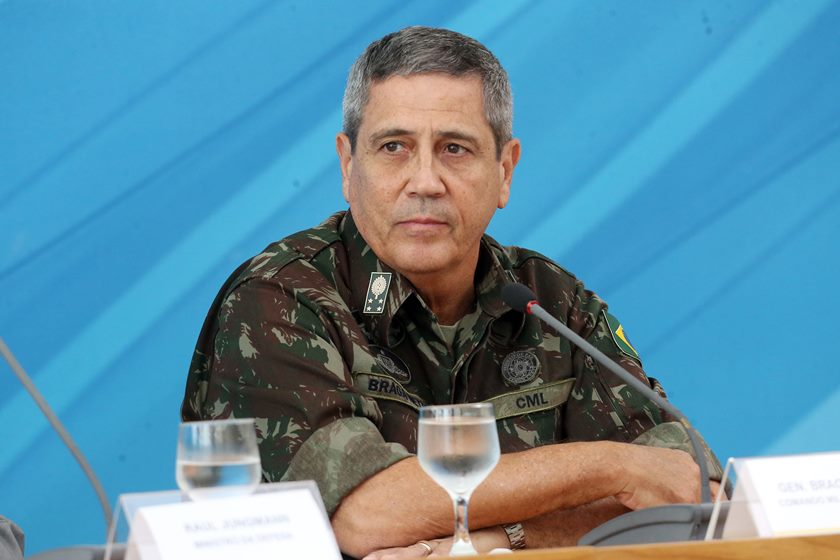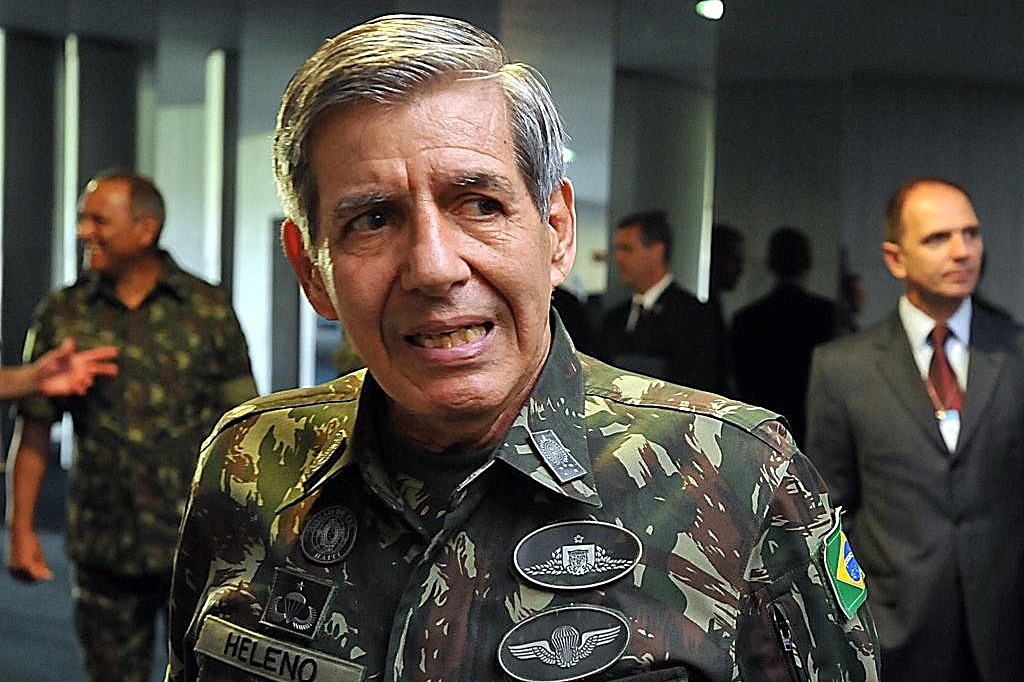RIO DE JANEIRO, BRAZIL – General Walter Braga Netto (born in Belo Horizonte, in 1957) joined the Jair Bolsonaro government with the previous experience of having been the federal intervenor of Public Safety in Rio de Janeiro.

In the Army, he would soon become Commander, a position desired by virtually everyone in their final stage of a military career.
He became number two in the Bolsonaro administration. Appointed as Chief of Staff of the Presidency by Augusto Heleno, head of the Institutional Security Cabinet, with the endorsement of the other two cabinet generals, Luiz Eduardo Ramos, Minister of the Government Secretariat, and Fernando Azevedo e Silva, Minister of Defense, he sought to bring order to the portfolio.
It was a difficult mission. The Chief of Staff was viewed negatively by the political class and by the President himself, given the absence of results from his predecessor, Onyx Lorenzoni, a federal deputy.
In a short time, the first military officer to hold such a high-ranking position after Brazil’s redemocratization became a sort of informal spokesperson for Bolsonaro. He has the hard task of containing the outbursts of the government’s ideological wing, those who wave the far-right banners and stir up the political base.
The attempt at restraint differs from his boss, who is much more easily connected with those of his advisors who do not mince their words, as was clear at the April 22nd ministerial meeting, which surfaced last Friday as part of the evidence in the inquiry investigating the President.
The cabinet meeting had been requested by the general, and revealed the tensions within the government. Braga Netto presented his “Marshall Plan” to tackle the post-pandemic financial crisis, the so-called Pró-Brasil, and it was clear that he had not discussed it with Paulo Guedes.
In the presentation, he relied on his allies Tarcisio Freitas, Minister of Infrastructure, and Rogerio Marinho, Minister of Regional Development, to advocate exceptional public spending measures against the “reforms” mantra and the privatizations sustained by Guedes.
But trying to portray the government’s post-pandemic performance is not his only job. In recent weeks, Braga Netto has become one of the architects of Bolsonaro’s defense strategy in the inquiry into five crimes involving the President and three other crimes involving the ex-Minister of Justice, Sérgio Moro.
The Minister became the behind-the-scenes presidential voice. Acting as an attorney, he delivered a speech in line with the other two general Ministers, echoing the President’s statement that at no point did he say he had an interest in interfering in the Rio de Janeiro Federal Police (PF) superintendency to protect his family.
For having coordinated the April 22nd cabinet meeting, the Chief of Staff was pointed out by Moro as a witness in the inquiry. Being forced to testify as a witness to a crime was something he did not expect in his career, allies say. But since he accepted the mission to protect the President, he had to prove his loyalty.
In his testimony, he reiterated that the President had an interest in changing his personal security team, not in the Federal Police. For those who watched the meeting videos or read the transcripts, however, it is clear that Bolsonaro wanted to interfere in the PF.

With an eye on the center
Governors in the National Congress call him “the intervenor” off the record. Hardly any decision on the Planalto is made without his consent. For instance, three of his ideas were readily accepted by Bolsonaro: (1) to give in to the charms of the Centrão parties, a non-ideological group that little by little scavenges patronage positions in the federal administration, in exchange for a promise to stymie any motion for impeachment or investigation; (2) to place the military in key positions in Ministries, like the number two and four directors in the Ministry of Health; and (3) to centralize data regarding the fight against the Covid-19 pandemic in his office in the Planalto Palace.
The initial aim of this last measure was to shift the focus away from then Minister of Health Luiz Henrique Mandetta, who, for advocating scientifically-based actions in the fight against the virus, ended up becoming antagonistic to Bolsonaro, who is virtually in denial about the pandemic.
However, Braga Netto was among those who maintained Mandetta in office on at least prior two occasions when the President wanted to fire him. And for that reason, he became the target of the ideological wing supporting the Bolsonaro Government. He saw criticism in profiles on social media, several of them by robots. On the other hand, an audio recording was circulating on WhatsApp assigned to him in which the announcer advocated military intervention. It was fake news.
With his diplomatic attributes, Braga Netto tries to bridge relations with the National Congress – unlike his fellow Minister Heleno, who is harshly critical of both Congress and the Centrão.
Over the past few weeks, his goal was to achieve a rapprochement between Bolsonaro and Chamber president Rodrigo Maia, from whom he gains respect and closeness because of the discussions he had during his time as an intervenor in Rio. And he succeeded when Bolsonaro and Maia met in at least two recent occasions.
On Friday, May 22nd, on a visit to Congress, he seemed to be at ease, even before a few opponents who challenged him regarding the prospect of military intervention. He said that the Bolsonaro government is not authoritarian, but rather democratic and center-right.
“The government is democratic, it is a center-right government. That’s a conspiracy theory that doesn’t exist. So there is no coup. I don’t know where you’re getting this idea from,” he said; however, his boss keeps on encouraging his radical base to protest against the other powers every chance he gets.
Shield
In an attempt to protect the Army and prevent the force from being accused of politicization, he asked to retire -to join the reserve- five months ahead of schedule. Still, he is perceived more as a military officer than a politician, despite being one of the Planalto’s main articulators.
Although he seems strict with strangers and some journalists – whom he has already instructed to study certain topics before asking questions and limiting the questions that could be asked when he was a federal intervenor in Rio – he is described as affable by those around him.
Two officers who worked with Braga Netto in the Military Command of the East, in Rio, and of the West, in Campo Grande, say that he usually surrounds himself with well-prepared people and, even if he disagrees with them, he listens to their considerations; this is something rare in the Planalto Palace.
Graduated in 1978 from the Agulhas Negras Military Academy (AMAN), one year after Jair Bolsonaro graduated, the Minister has traveled diplomatic routes to reach his current position. He was military attaché in the embassies of Washington and Warsaw.
During the Dilma Rousseff/Michel Temer administration, he was appointed as head of security for the Rio Olympic Games. When he became the head of Rio’s Civil Police, State Police, Fire Department, and Penitentiary Administration, as a federal intervenor, he deepened his knowledge of Rio’s militia and organized crime. All this occurred at a time of extreme crisis, when the administration of Rio de Janeiro was shattered and involved in a number of corruption scandals.
Once named Chief of Staff, he succeeded in centralizing the main government actions by heading the Covid-19 crisis office. In the April 22nd cabinet meeting video, he implies that he is aware of the gravity of the problem. When the president of the Bank of Brazil, Rubem Novaes, says he thinks the peak of the pandemic has already passed, Braga Netto replies: “You haven’t seen the numbers we saw up there”.
In the crisis group, he supported the view that the government should start emphasizing the number of people who were cured of the coronavirus, not only the dead. The concept was badly received by the public, because it seemed that the entire administration had bought Bolsonaro’s discourse and had started filtering the most critical information, while every day the number of people killed by the disease is growing rapidly.
On Saturday, May 23rd, when the country reached the 347,398-mark for Covid-19 infections and 22,013 confirmed deaths, the Ministry of Health stressed that 142,587 lives had already been saved.
Source: El País

